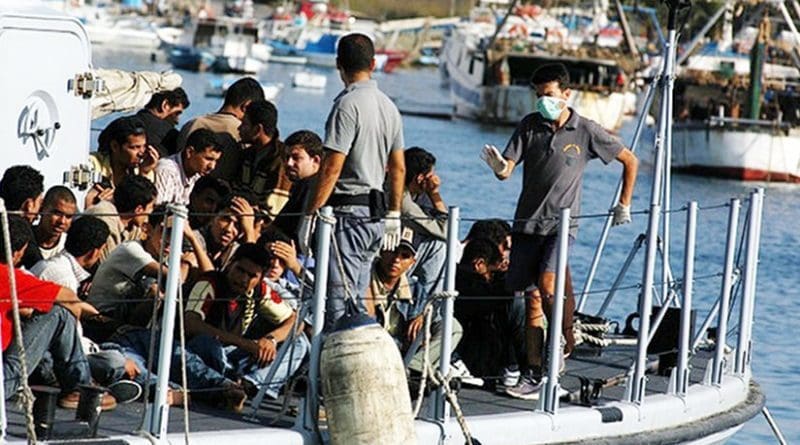EU’s Indecision On Migration A Key Issue As Elections Loom – OpEd
By Arab News
By Khaled Abou Zahr
The front-page headline of French newspaper Le Figaro on Monday described the situation on Lampedusa as: “Europe powerless in the face of the migrant influx.” The small Italian island witnessed 7,000 migrants arrive in just two days, forcing it to be overrun, according to the mayor of the island and the UN Refugee Agency. Lampedusa, which itself has a population of less than 7,000, has historically served as a stopping point for travelers coming from North Africa and it has now become a focal point for Europe’s migration crisis.
The EU has been unable to achieve a common agreement on asylum and migration. It has become the crisis that symbolizes Europe’s inability to make decisions on key geopolitical, security, defense and economic challenges.
A 10-point strategy to combat the spike in migrant arrivals was unveiled by European Commission President Ursula von der Leyen on Sunday as she visited Lampedusa with Italian Prime Minister Giorgia Meloni. The current situation on the island is unbearable for the migrants as well as the local population and its infrastructure. Yet, beyond the humanitarian aspect, the EU will have to come up with a clear solution to solve the migrant crisis, especially as the old continent is also facing a tough situation with the war in Ukraine and high inflationary pressure.
Moreover, this crisis comes as citizens of EU countries are preparing to elect, in June 2024, their representatives to the European Parliament. MEPs shape and decide on new laws that influence all aspects of lives across the bloc. Moreover, the principle of primacy (also known as priority or supremacy) of EU law applies and is based on the idea that, in the event of a conflict between an aspect of EU law and that of a member state, the former takes precedence.
In this tense context, many analysts have noted that the migration crisis will be a rallying point for Europe’s various far-right movements. This has been made clear, with the leader of France’s National Rally, Marine Le Pen, this month participating in the annual celebration of her Italian ally Matteo Salvini’s League party. The migration crisis on Lampedusa provided an opportunity for them to demonstrate their strength ahead of the 2024 European elections. In the same manner, the lead candidate of another French right-wing party, Reconquest’s Marion Marechal, who is a niece of Le Pen and a former National Rally MP, went to the island and denounced European and French migration policies nine months before the election. The Republicans have followed suit with the same objective.
The way most traditional media outlets and political forces are brushing it off as a rallying point for the far-right are greatly mistaken. This is the best way of avoiding making the real and tough decisions that are needed. And it will continue to bring not only this small Italian island to the brink of a catastrophe, but also the integrity of the EU itself.
The reality is that the EU is divided on many topics and Germany’s rivalries with France and Italy are becoming dangerous. What most fail to understand is that the so-called far right is expressing the fears of local populations about the bureaucracy and middle management in Europe going forward, with laws that supposedly destroy their way of life. Whether true or not, this fear — as well as the current challenges — need to be addressed.
In Sweden, in contrast to his predecessors, Prime Minister Ulf Kristersson has taken a tougher stance on immigration. The election that brought him to power had as its main topics immigration, crime and integration. Sweden had been extremely generous and open to migrants, whether refugees or asylum seekers, but it started to face a dangerous and over-stretched situation. This shows that the great principles of humanity pushed by the left need to account for local traditions, as well as to find a balance that maintains stability and peaceful living. It is easy to promise generosity on someone else’s dime, yet when it affects you, the situation changes.
For the EU, the main issue is the contradictory policies and various approaches. In fact, we have witnessed a different approach from Germany, for example, which has encouraged migration to compensate for its aging population. In contrast, countries such as Hungary have opposed any uncontrolled influx that might shake local stability and security. There is also a disparity between the way Ukrainians have been welcomed in comparison to people from Africa. But this should not shock or surprise anyone. The reality is that charity begins at home and the EU needs to care for its own at the moment.
This is why it is important for the EU to take into account all these fears and the stability of all member states in order to formulate a policy that solves the current crisis, while balancing its humanitarian duties. The fact that no one asks how these flows are being organized and who is really behind this push is quite surprising. The real criminals are the organizations that put all these lives in peril, not European citizens. I would not be surprised if they are supported or backed by states that aim to destabilize Europe. One thing that is certain is that, if the EU’s indecision persists, this might be the domino that leads to the fall of years of positive construction.
- Khaled Abou Zahr is the founder of Barbicane, a space-focused investment syndication platform. He is CEO of EurabiaMedia and editor of Al-Watan Al-Arabi.

